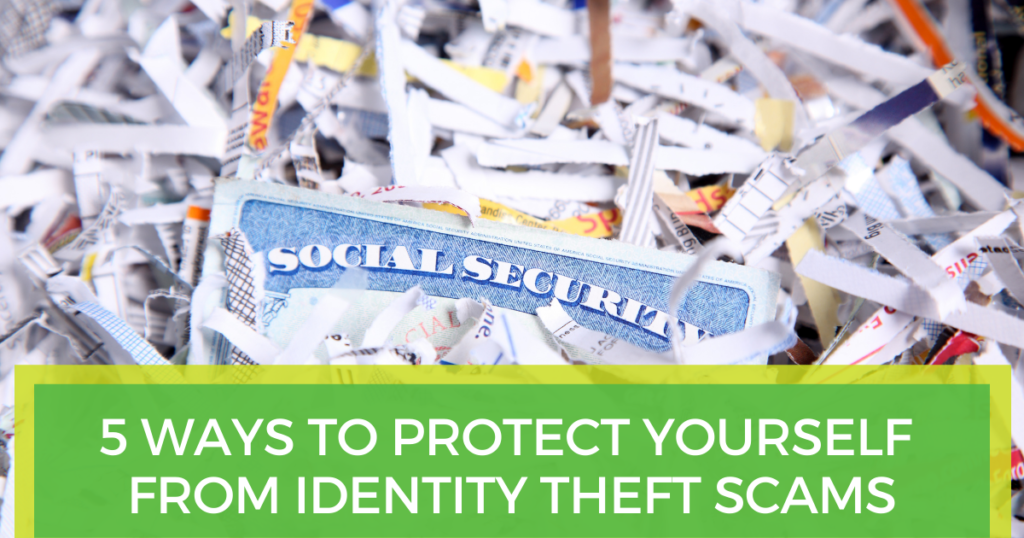-

Identity theft isn’t new, but the proliferation of online shopping at this time of year makes it easier than ever for thieves to access your sensitive financial information. Add to that the coming end-of-year tax filing deadline and ongoing COVID-19 pandemic, and you’ve got the perfect opportunity for online identity theft.
It takes one unguarded move on your part to grant scammers access to your social security number, passwords, and banking information. Prevent identify theft with some upgraded security measures for yourself and all the members of your household.
Here are four ways to get started, in no particular order. They’re all important steps to protect against identity theft.
Step 1: Clean up your internet access points
Avoid accessing anything that requires a login when you’re on public wi-fi, which is a virtual candy store for hackers (especially online shopping). Secure your home wi-fi access point with a password that’s hard to guess, and set up a virtual private network at home and your mobile devices for even more security.
Step 2: Upgrade passwords and security practices
Make sure all your devices with internet access have antivirus and security software (with a firewall) installed and running. Avoid using websites that don’t have https:// at the beginning of the URL. The Bsquared website URL, for instance, (https://askbsquared.com/) has the -s at the end of http:, and that’s a good sign that the site is secured against malware and hackers. Also, look for the locked padlock icon next to the site address when you’re on the site.
Passwords should be a phrase that’s hard to guess. If you need help with passwords, consider using a service like LastPass to create a password vault so you don’t have to worry about forgetting login credentials.
Step 3: Don’t click that link, and beware of unbelievable deals
Don’t click on links in emails, text messages, or social media messaging services.
Your friend probably didn’t actually send you a video they think you’re in.
That pair of boots or iPad being sold for pennies on the dollar by some random church Facebook page in nowhere, Wisconsin, probably isn’t legitimate.
Use delivery service tracking apps and websites to track packages instead of clicking links sent by someone claiming to be from the company. Links you aren’t expecting can be phishing scams or links to malware, both with the aim of stealing your financial information. Don’t click that link and don’t buy from unknown sellers!
Step 4: Back up essential data
Use a cloud-based or external hard drive to back up sensitive data so that you can recover it in the event of a malware attack. That’s good insurance for any data, but especially for tax documents, financial statements, and any files you use for work or school.
Step 5: Use an IRS PIN to secure online filing data
As you prepare to file your tax returns, secure your returns and all supporting documents by requesting an Identify Theft PIN from the IRS. The agency also offers a PIN recovery service if you’ve already had your identity stolen.
Learn more about what the IRS is doing to help fight identity theft.
Keep your information secured at every step
At Bsquared, we’re dedicated to protecting our clients from identity theft and fraud. We use verified and secure online methods of communication, financial record-keeping, and tax preparation. If you’re worried about the security of your identity and finances, contact us today to learn how Bsquared accounting, small business, and tax services can add an extra layer of security to your online life.

Bsquared
Customized Solutions for Your Accounting & Business Needs
Offices in St. Louis, MO & Panama City Beach, FL
MO (636)-333-3339 & FL (850)-775-1675
info@askbsquared.com
Customized Solutions for Your Accounting & Business Needs
Offices in St. Louis, MO & Panama City Beach, FL
MO (636)-333-3339 & FL (850)-775-1675
info@askbsquared.com
BUSINESS HOURS
Business Hours
Monday - Friday
9AM - 5PMSaturday & Sunday
ClosedSERVICES
The Small Business Advantage RSS FEED
What Are the Tax Advantages of an LLC?
One of the most significant considerations when choosing a business structure for your company is: “ Nellie Akalp
How to Build a Tech Team: 10 Tips for Leaders
For many modern businesses, tech teams are the backbone of operations. Business leaders can support YEC
© Copyright B Squared, Inc. 2020 | All rights reserved.

